
Booking.com’s 2021 Sustainable Travel Report Affirms Potential Watershed Moment
(Shared from globalnews.booking.com )
Latest research from Booking.com reveals how the ‘pandemic effect’ could finally tip sustainable travel intent into impactful action.
83% of global travelers think sustainable travel is vital, with 61% saying the pandemic has made them want to travel more sustainably in the future.
Almost half (49%) still believe that in 2021, there aren’t enough sustainable travel options available, with 53% admitting they get annoyed if somewhere they are staying stops them from being sustainable, for example by not providing recycling facilities.
While 3 out of 4 accommodation providers say they have implemented at least some kind of sustainability practices at their property, only one-third actively communicate about their efforts proactively to potential guests.
To help boost the visibility of more sustainable stay options, Booking.com is now showing third-party sustainability certifications and details on a range of 30+ impactful practices in place at hundreds of thousands of properties around the world.

New research released from Booking.com, containing insights gathered from more than 29,000 travelers across 30 countries, suggests that the pandemic has been the tipping point for travelers to finally commit to their own sustainable journey, with 72% of global travelers believing people have to act now to save the planet for future generations. As the world of travel starts to open up again, Booking.com’s 2021 Sustainable Travel Report reveals that travelers are more committed than ever to do so in a mindful way, with two thirds (61%) stating that the pandemic has influenced them to want to travel more sustainably in the future and almost half (49%) admitting that the pandemic has shifted their attitude to make positive changes in their everyday lives, with recycling (49%) and reducing food waste (42%) being the top priorities at home.

According to the findings, travelers’ day-to-day sustainable commitments are consistent with their intentions for future trips with 84% wanting to reduce general waste, 83% wanting to reduce their energy consumption (e.g. by turning off air conditioning and lights when they are not in a room) and 79% wanting to use more environmentally friendly modes of transport such as walking, cycling or public transport over taxis or rental cars. Respect for the local community is also high on the list as almost three quarters (73%) want to have authentic experiences that are representative of the local culture when they travel, 84% believe increasing cultural understanding and preservation of cultural heritage is crucial and 76% want to ensure the economic impact of the industry is spread equally in all levels of society. Furthermore, 69% will go as far as avoiding popular destinations and attractions to ensure they aren’t contributing to overcrowding challenges and helping do their part to disperse the positive benefits of travel to less frequently visited destinations and communities.
Breaking down sustainable travel barriers Fortunately, it’s not just good intentions. Many of these sustainable pledges are coming to fruition, with travelers revealing that while on vacation in the past 12 months, 45% made a conscious decision to turn off their air conditioning/heater in their accommodation when they weren’t there, 43% took their own reusable water bottle, rather than buying bottled water while on vacation and 33% did activities to support the local community. In fact, over half (53%) have admitted that they get annoyed if somewhere they are staying stops them from being sustainable, for example by not offering recycling facilities. The positive signs are indeed there, but there is still lots of room for improvement with more than half of travelers not yet thinking about the local community during their trips or taking these small steps to minimise their impact.

While 81% of travelers say they want to stay in a sustainable accommodation in the upcoming year - which is a notable increase from 62% in 2016, when Booking.com first conducted its sustainable travel research and up 7% from 74% in 2020, just prior to the pandemic - barriers still remain. In fact, when looking just at the 40% of global travelers that said they have not stayed in a sustainable property in the past year, 36% said they didn’t even know that they existed, 32% said they couldn’t find any options where they were traveling and 31% said that they didn’t know how to find them. In fact, 49% of travelers still believe that in 2021, there simply aren’t enough sustainable travel options available.
In terms of awareness and intentions, travelers and properties do appear to be on the same page, with new research revealing that 82%** of Booking.com's accommodation partners surveyed view sustainability in the hospitality industry as being important. This mirrors the 83% of travelers who also believe sustainable travel is an important issue. However, although 3 out of 4** accommodation partners say they have implemented sustainable steps at their property, only one-third (31%**) actively communicate about their efforts proactively to potential guests, with this mostly happening at the time of check-in (59%**), indicating that significant challenges remain to making sustainability information easy to access for travelers at earlier stages of the booking process.

Closing the gap, step by step
As part of Booking.com’s mission to make it easier for everyone to experience the world and as a leader in travel, the company believes they have an important responsibility to make sustainable choices easier, both for accommodation providers and travelers. That’s why the company is currently rolling out a program for properties that will support them in taking the next steps to become more sustainable, no matter where they might be on that journey. This includes sharing guidance, insights and best practices with properties via various educational opportunities, including handbooks and dedicated content, all available via the Booking.com Partner Hub .

In connection, Booking.com is currently displaying over 30 certifications officially approved by the Global Sustainable Tourism Council (GSTC), Green Tourism and the EU Ecolabel, as well as multiple hotel chain sustainability programs. The company is sourcing this information directly from the certification bodies and displaying it on the property pages of partners who hold one of these established third-party certifications. To complement this, Booking.com is also encouraging its accommodation partners to update their sustainability information, which includes 32 impactful practices across five key categories: waste, energy and greenhouse gases, water, supporting local communities and protecting nature. From this global roll-out, hundreds of thousands of properties have already started to share at least some of their sustainability information with Booking.com, which can be viewed on the ‘Sustainability initiatives’ banner on each of their property pages. While it’s still early days, this is an important first step in providing more sustainability information in a transparent way to consumers, ultimately making it easier for them to start making more sustainable travel choices.
“Over the six years we’ve been conducting this research, it’s been inspiring to see awareness of the importance of sustainable travel consistently grow, both with our customers and now with our partners, too,” said Marianne Gybels, Director of Sustainability for Booking.com. “The good intentions are there on all sides, but there is still a lot of work to be done to make sustainable travel an easy choice for everyone. The more sustainable practices we can help our partners to identify and implement, the more we can experiment with how best to highlight this information to customers and ultimately make sustainability a transparent and easily identifiable part of their travel decision-making process. A small change like eliminating single-use plastics or switching to energy-efficient LED light bulbs might seem insignificant in isolation, but multiplied by millions of travelers and properties around the world, these small steps all start to add up to a much bigger potential positive impact.”

Methodology
*Research commissioned by Booking.com and independently conducted among a sample of 29,349 respondents across 30 countries and territories (1,000 from USA, 1,007 from Canada, 1,000 from Mexico, 964 from Colombia, 1,000 from Brazil, 1,000 from Argentina, 999 from Australia, 941 from New Zealand, 1,001 from Spain, 1,000 from Italy, 1,000 from France, 1,000 from UK, 1,000 from Germany, 1,003 from Netherlands, 986 from Denmark, 1,000 from Sweden, 997 from Croatia, 1,005 from Russia, 1,003 from Israel, 1,000 from India, 1,000 from China, 1,005 from Hong Kong, 968 from Thailand, 963 from Singapore, 1,000 from Taiwan, 1,005 from Vietnam, 1,000 from South Korea, 1,000 from Japan, 1,002 from South Africa and 500 from Kenya ). In order to participate in this survey, respondents had to be 18 years of age or older, had to have traveled at least once in the past 12 months and must be planning to travel in 2021, and be either the primary decision maker or involved in the decision making of their travel. The survey was taken online and took place in March 2021.
**Research conducted by Booking.com with a representative sample of 3,390 accommodation providers from Australia, Austria, Brazil, China, Croatia, France, Germany, Greece, India, Indonesia, Italy, Japan, Mexico, Poland, Portugal, Russia, Spain, Thailand, the United Kingdom and the United States. The survey was taken online and took place in April 2021.
Recent Posts
Grant Recipients of the 2019 Booking Booster
2019 Booking Booster: Meet the Startups
Grant Recipients of the 2018 Booking Booster
How we travel: a look at sustainable travel habits
Now in its eighth year, Booking.com’s annual Sustainable Travel Report has gathered insights from over 33,000 travellers across 35 countries and territories and reveals some eye-opening trends in travel. It highlights how economic uncertainty is informing sustainable travel decisions in 2023 – with people facing the dilemma of potentially feeling forced to choose between cutting costs and making more sustainable travel choices.
Sustainability is clearly front of mind, with three-quarters of travellers believing people need to act now to save the planet for future generations. Recent climate change news is a key influence for 53%, who say that it has encouraged them to try to make more sustainable choices. And yet, while nearly half (49%) think that environmental issues will worsen in the next six months, 64% believe the cost of living crisis will, too; this leaves people unsure of what to prioritise as they strive to reconcile their conflicting concerns.
Read on to discover more about global sustainable travel in 2023.
In two minds over sustainable travel
The cost of living crisis and the climate crisis are two huge topics at the front of people’s minds. Over three quarters (76%) of travellers say they want to travel more sustainably over the coming 12 months.
But the same amount of people feel trapped between a rock and a hard place – nearly half of those asked feel that they must make a choice between sustainability and spending, with 49% believing more sustainable travel options are too expensive. On the other hand, there are others who feel a greater sense of urgency for environmentally conscious travel choices – with 43% willing to pay more for options with sustainable certification.
Breaking through barriers to sustainability
But it’s not just cost stopping people from travelling more sustainably; it’s also about lack of choice. Over half (51%) of travellers in 2023 believe there are not sufficient sustainable travel options, which 74% of people believe should be offered by travel companies.
And of the travellers keen to travel more sustainably, a huge proportion of them don’t even know where to find more environmentally friendly options; 75% seek authentic local tours and cultural activities that give back to the community they visit, yet 40% don’t know how or where to book such experiences.
Sustainable habits at home and on holiday
Despite financial constraints, 80% of travellers say that travelling more sustainably is important to them. These travellers are trying to make a difference by making small changes both at home and while staying in hotels or holiday rentals – encouragingly, today 68% use reusable shopping bags, 64% recycle waste and 58% carry their own reusable water bottle.
More than three-quarters (77%) say they turn off the lights and appliances at the place they’re staying when they aren’t there, while almost half (45%) now recycle their rubbish when travelling. People are also making more environmentally conscious choices on holiday when it comes to transportation, with 43% now planning their sightseeing so that they can walk, cycle or take public transport. Meanwhile, 43% try to travel outside of peak season in a bid to avoid overcrowding and most adopt the ‘buy local’ mantra while on holiday, with 43% favouring small, independent shops.
Moving sustainable travel forward
It is clear that – even amid rising climate anxiety – travellers are becoming more responsible consumers, with two thirds wanting to leave the places they visit better than when they arrived. 65% of travellers would feel better about staying in a particular property if they knew it had a sustainable certification or label, while 59% want to filter their options for those with a sustainable certification next time they book.
The travel industry must adapt to meet the expectations of sustainably minded consumers in the face of the climate crisis. Still, with one in four (39%) travellers today not trusting that the sustainable travel options labelled are truly more sustainable, there are huge strides for the travel industry to make in gaining the trust of consumers.
In addition to revelations about global travel habits, the data also pulled up some interesting divergence between markets when it comes to sustainability. Now, we’ll take a deep dive into the sustainable travel data of individual countries.
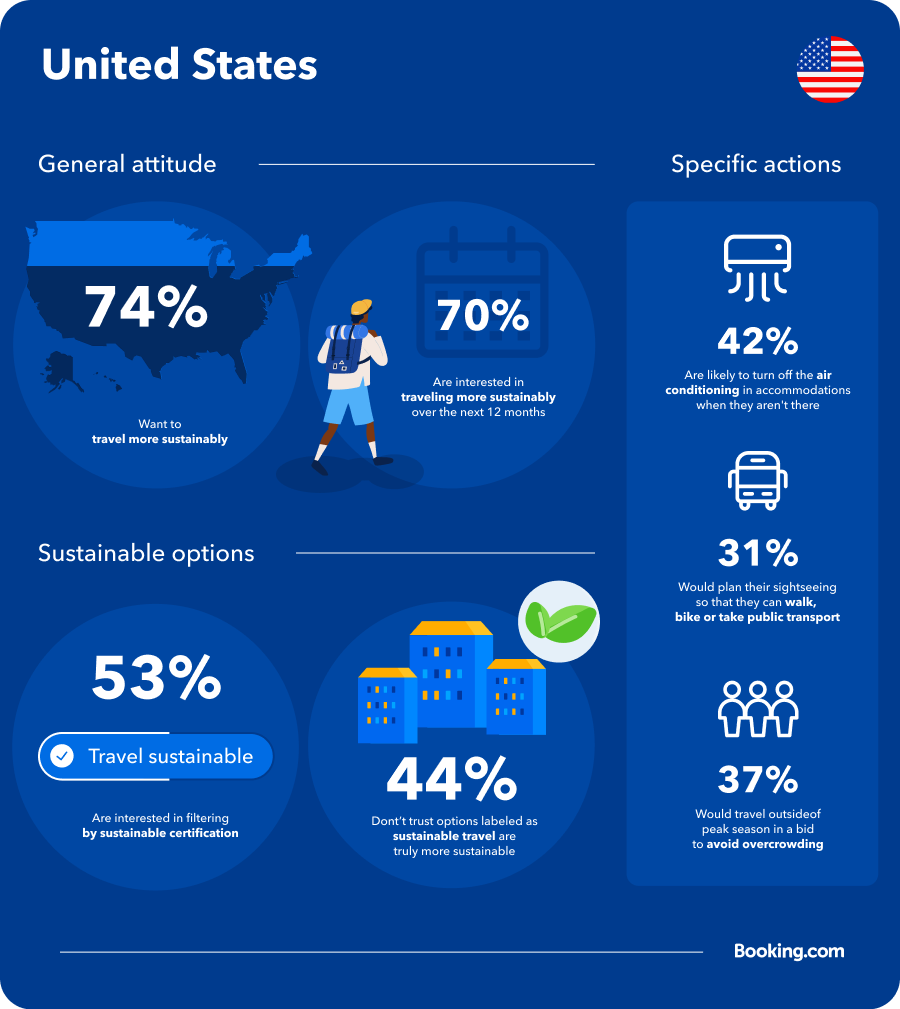
According to Booking.com’s research, travelling more sustainably is less important to those from the US (74%) than the global average. US travellers' answers suggested they are less likely to plan sightseeing trips that utilise public transport (31%), and less likely to travel outside of peak season with a view to avoid overcrowding (37%).
44% of travellers in the US were less likely to trust that the options labelled as sustainable are truly sustainable, while the same percentage of travellers felt encouraged to be sustainable by recent climate news (which is less than the global average global average).
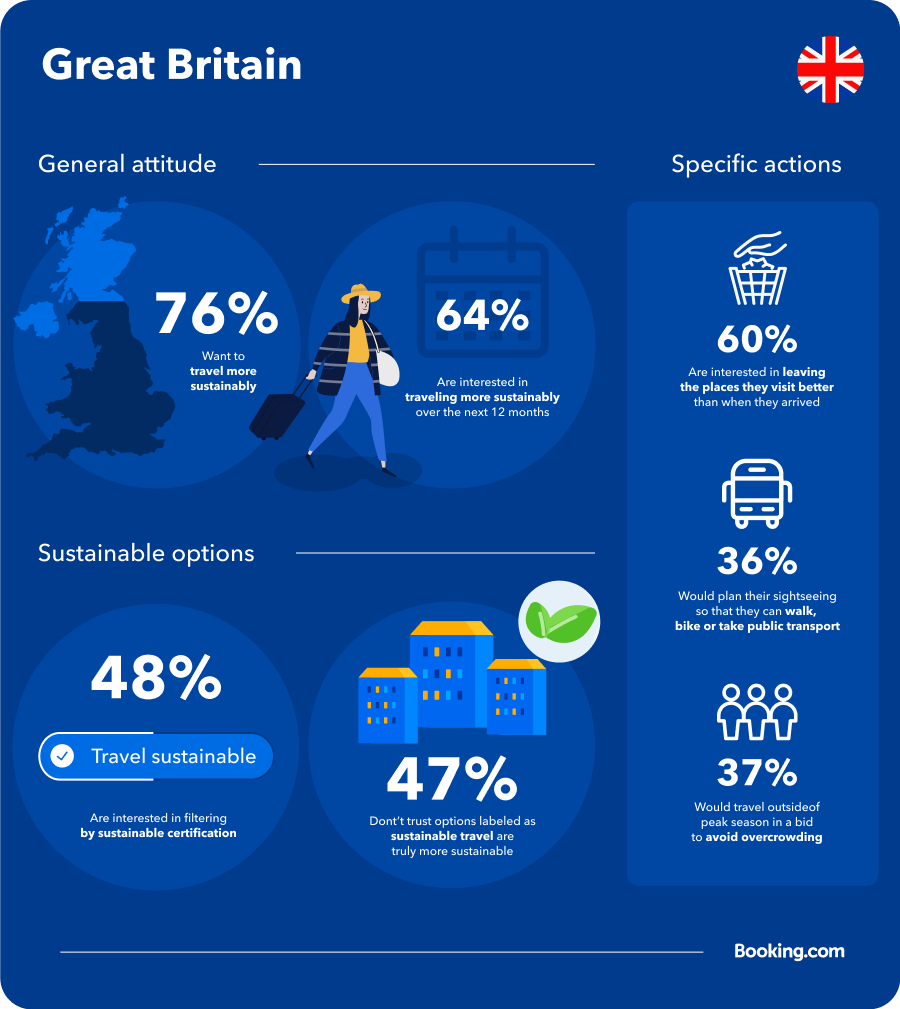
For 76% of travellers from the UK , travelling more sustainably is less important than for the global average. UK tourists are less likely to plan their sightseeing around using public transport, and are also cynical about certifications or labels.
48% are less interested than the global average in filtering properties for sustainable certifications, and are less likely than the global average to trust options labelled as sustainable to be truly more sustainable (47%).
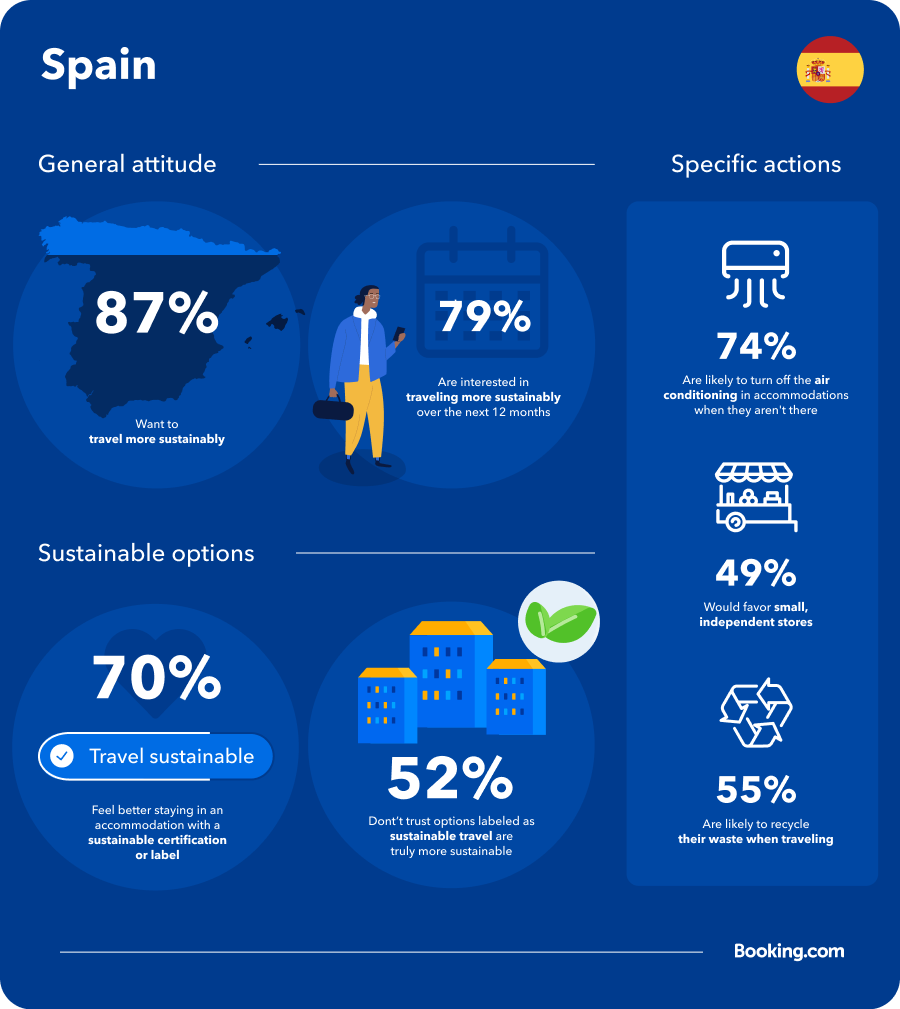
For Spanish tourists, travelling sustainably is more important (87%) – particularly over the coming 12 months – than it is to the global average. Tourists from Spain are also more likely to turn off air conditioning in properties when they aren’t there, are more likely to use reusable shopping bags, are more likely to favour independent shops and are more likely to recycle when travelling.
Finally, 70% of Spanish travellers are more likely to be reassured by a sustainable certification or label for a property they are staying at. But they are much less convinced (52%) than the global average (39%) that they can truly trust sustainable labels as equating to more sustainability.
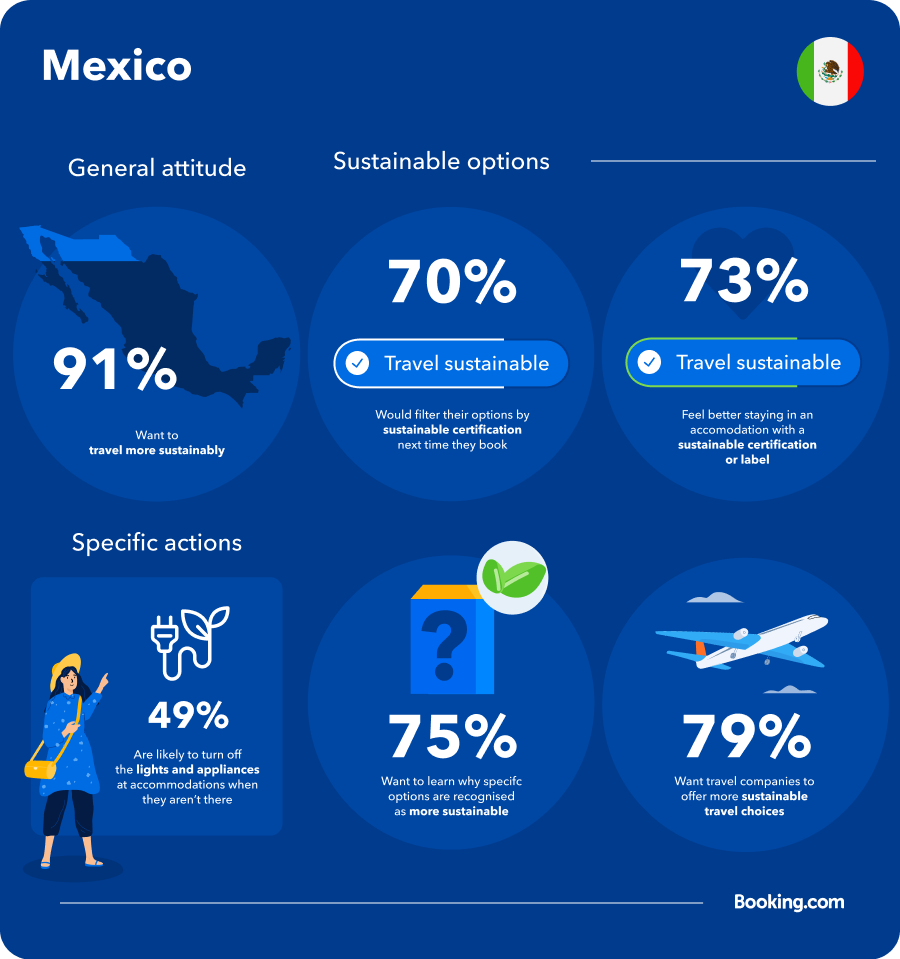
Compared to the global average, tourists from Mexico say that travelling sustainably is much more important to them (91%). And they are also much more interested in doing so over the coming 12 months (90%). 73% of Mexican tourists are more likely to feel better about staying in a particular property if it has a sustainable certification or label, as well as more keen than the global average to be able to filter places to stay for sustainable certifications.
Finally, Mexican travellers are more likely than the global average to want travel companies to offer sustainable travel choices, and 75% are more interested in learning why specific options are recognised as sustainable.
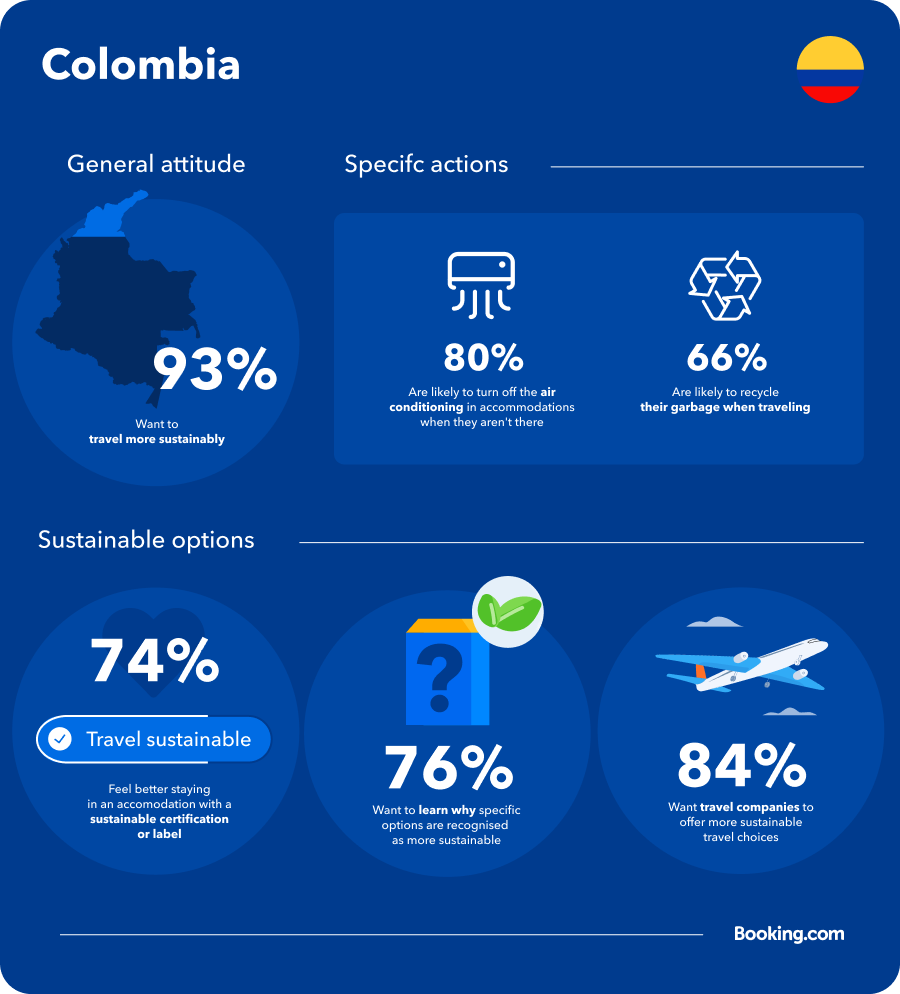
Travellers from Colombia are more interested in travelling sustainably than the global average, including over the coming 12 months. In terms of sustainable options, 74% of Colombian tourists are more likely to feel better about a particular place to stay if they know it has a sustainable certification or label.
They are more likely than the global average to want travel companies to offer more sustainable options (84%), more likely to want to filter places to stay based on sustainable certification next time they book (73%), and are more interested in learning why specific properties are recognized as more sustainable (76%).
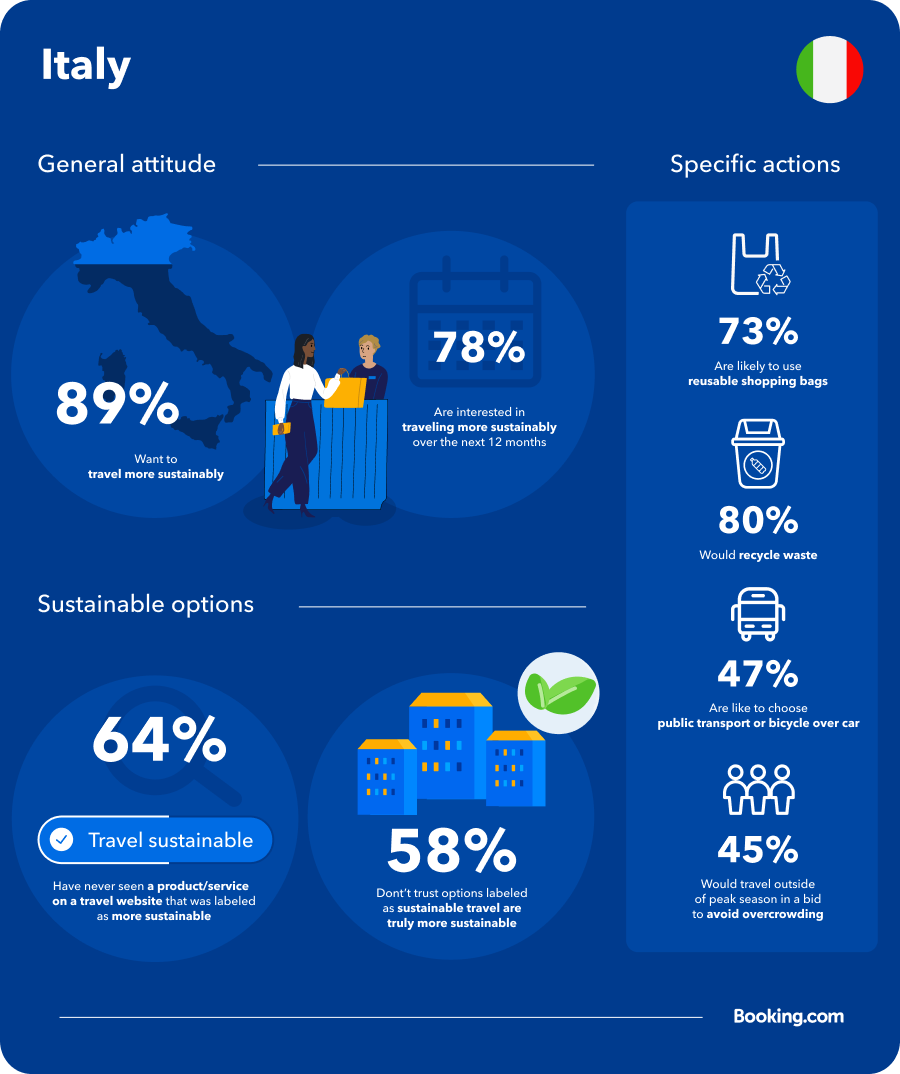
In terms of a general attitude towards travel, Italian tourists are more likely than the global average to consider sustainability in their plans. They are more determined (79%) than the global average to make sustainable choices when travelling now than a year ago, with recent news about climate change having been a major influence.
Travellers from Italy are more interested in learning about why a specific option received a certification (73%) than the global average. But at the same time, they seem less confident than the global average about whether properties labelled as sustainable are actually more sustainable. And also seem more convinced than the global average that there aren’t enough sustainable options, or that it’s too hard to find these options.
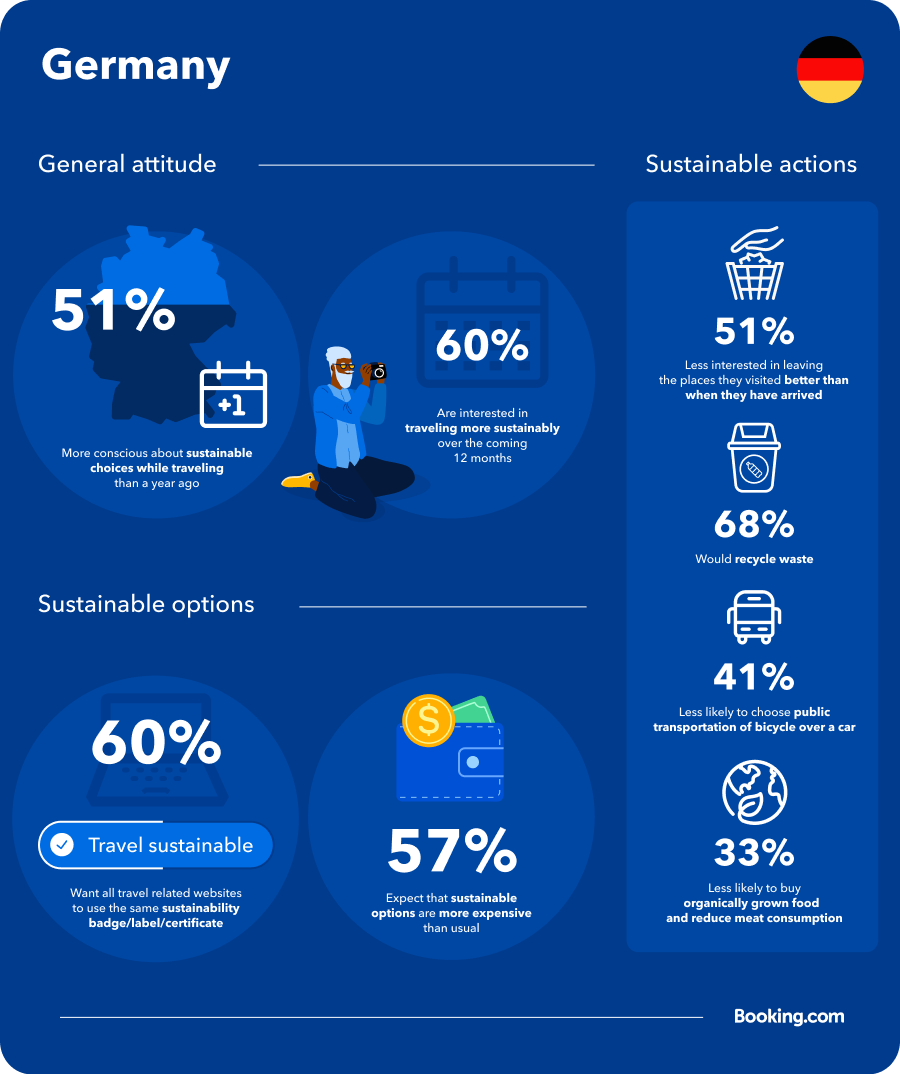
Over half (66%) of travellers from Germany want more sustainable options to be offered by travel companies, while 60% are more conscious about sustainable choices while travelling than a year ago. When it comes to future plans, German travellers are more likely than the global average to travel more sustainably in the coming 12 months, and more likely to embrace travels closer to home.
However, they are less likely to buy into more sustainable options, finding that they’re often too expensive. And are also less likely to trust that travel options labelled as being more sustainable are actually more sustainable.
Stay in the know
Error: Please enter a valid email address
Error: Sorry. An error has occurred.
Thanks! We've sent you an email so you can complete your subscription
List your property
- Mobile version
- Your account
- Make changes to your booking online
- Customer Service help
- Booking.com for Business
- Places of interest
- Guest Houses
- Unique places to stay
- Discover monthly stays
- Unpacked: Travel articles
- Seasonal and holiday deals
- Traveller Review Awards
- Flight finder
- Restaurant reservations
- Booking.com for Travel Agents
- Coronavirus (COVID-19) FAQs
- About Booking.com
- Partner help
- Sustainability
- Press centre
- Safety resource centre
- Investor relations
- Terms & Conditions
- Partner dispute
- How we work
- Privacy & Cookie Statement
- Cookie Settings Manage cookie settings
- MSA Statement
- Corporate contact
- Content guidelines and reporting
Booking.com is part of Booking Holdings Inc., the world leader in online travel and related services.
Verified reviews from real guests.
We have more than 70 million property reviews, and they're all from real, verified guests .
How does it work?
It starts with a booking.
The only way to leave a review is to first make a booking. That's how we know our reviews come from real guests who have stayed at the property.
Followed by a trip
When guests stay at the property they check out how quiet the room is, how friendly the staff are and more.
And finally, a review
After their trip, guests tell us about their stay. We check for naughty words and verify the authenticity of all guest reviews before adding them to our site.
If you booked through us and want to leave a review, please sign in first.
Booking Holdings 2021 Sustainability Report

Booking Holdings is the world’s leading provider of online travel and related services across more than 220 countries and territories through six primary consumer-facing brands: Booking.com, Rentalcars.com, Priceline, Agoda, KAYAK and OpenTable. Their online platforms connect consumers with travel service providers around the world — as well as other services such as travel-related insurance products and restaurant management services. The company’s 2021 Sustainability Report highlights their sustainability framework and progress made thus far.
In 2021, Booking.com surveyed 29,000 travelers about sustainable travel.
In 2021, Booking.com surveyed 3,390 accommodation providers about sustainable travel and found that 82% of partners we surveyed think sustainability is an important topic.
Agoda’s 2021 Sustainable Travel Survey states the top three additional measures needed to make travel more sustainable are: easy identification of sustainable eco-friendly travel options, limited use of single-use plastics, and financial incentives for accommodation providers that maximize energy efficiencies.
Recycling is the biggest concern for travelers at home, and excess waste while away from home. 81% of travelers surveyed say they want to stay in sustainable accommodations.
Across their brands, the company has created useful tools and guides that enhance experiences and include information about the environmental impact of customers’ travel options.
In 2021, KAYAK launched several new sustainable travel awareness initiatives, including the addition of a Most Sustainable Airlines category to its annual KAYAK Travel Awards 2021 in partnership with Atmosfair.
In 2022, Booking.com plans to further increase transparency around sustainable travel options across flights and ground transportation and is exploring the ability to sort flights by carbon footprint and offering electric or hybrid car rentals.
In 2021, the Booking.com Travel Sustainable Program launched its program’s flagship initiative: the Travel Sustainable badge for accommodations. The badge facilitates an impact-driven roadmap for partners to improve their sustainability practices and is also a cost-free recognition of a property's current sustainability efforts.
They have already awarded the badge to 76,470 partners as of the end of 2021, and plan to expand it in 2022 by defining the framework for flights, car rentals, and taxis. The eventual hope is to launch the program badge across all relevant Booking Holdings brands by 2023.
Agoda was recognized for its contribution to the environment through carbon sequestration with a Climate Action Award during the Sustainable Wellness Destination Climate forum, hosted by FeedUp@UN and the Agricultural and Food Marketing Association for Asia and the Pacific.
In 2021, Booking.com worked closely with other Travalyst partners (a nonprofit organization that is convening a global alliance of leading travel and tourism service providers) to unify its framework for sustainability.
Booking Holdings has reduced their scope 1 and scope 2 emissions by 92% from the 2019 baseline. By the end of 2030, the company aims to reduce their scope 1 and 2 emissions by 95%.
The reduction thus far has been primarily due to a 2021 transition to 100% renewable electricity across the enterprise through the purchase of unbundled energy attribute certificates (EACs) that matched their total electricity consumption for the year (of which 92% is compliant with the RE100 market boundary criteria).
The company’s scope 3 emissions generated within their supply chain account for 99% of their total footprint.
In 2021, Booking Holdings expanded their scope 3 emissions by adding Employee Commuting and Purchased Goods and Services to the existing Business Travel category.
They set a target reduction of 50% in scope 3 carbon emissions by 2030, and key reduction initiatives include: business travel, employee commuting, and purchased goods and services purchased.
The company has four carbon offset projects located across Zimbabwe, Argentina, Indonesia, and Canada.
Under the electronic recycling program, out-of-use equipment is refurbished and resold or dismantled for recycling. In 2021, Booking.com and Agoda collectively diverted more than 8,500 units of electronic equipment for recycling.
Together with the World Wide Fund for Nature, Agoda planted 5,000 trees on behalf of Agoda’s Gold Circle Award winners, an awards program that recognizes property partners who have distinguished themselves with superior service and guest reviews.
As an exclusive incentive for vaccinated travelers, Agoda donated $10 per booking for a total of $20,000 towards WWF-Philippines' whale shark and habitat conservation programs.
of travelers say they want to stay in sustainable accommodations
travel provider partners have been awarded the Travel Sustainable badge
We made important strides throughout 2021, focusing not only on helping the travel industry continue to recover, but also working to make travel more sustainable.
Glenn Fogel
CEO and President of Booking Holdings
From climate change to animal welfare, Booker is working to create a more sustainable travel future that amplifies the benefits of tourism and mitigates the negative impacts — and ultimately makes certain the planet, its people, communities, habitats, and wildlife can thrive today and into the future.
Through product innovation, travel provider partner support, and industry collaboration, Booking Holdings and their brands have committed to (and made progress towards) making sustainable travel and education easier for millions of customers worldwide.
reduction in scope 1 and 2 emissions from the 2019 baseline
units of electronic equipment diverted for recycling
As a company, we believe Sustainability is multifaceted, and we have evolved from a more traditional corporate citizenship approach to embracing a shared-value sustainability framework.

Get the best content and best stories in your inbox every day!
- News & Features
- Air Quality
- Cleaning & Maintenance
- Energy Management
- Green Design
- Heating & Cooling
- Kitchen & Laundry
- Sales & Marketing
- Sustainability
- Waste Management
- Water Conservation
- Guest Columns
- Publisher’s Point of View
- Certification Programs
- Green Hotel Focus
- Green Organizations
- Green Videos
- Hotel Company Green Pages
- Personnel Profile
- Renewable Energy All Stars
- Founding Sponsors
- Supplier Spotlight Archive
- Vendor Case Studies
- Vendor News
- Vendor Videos
- Product & Service Directory

- Publisher's Point of View
Booking.com Releases Sixth Annual Sustainable Travel Report

Booking.com just released its sixth annual Sustainable Travel Report ( see related article ). It is based on one of the travel industry’s largest surveys and worth paying attention to. A total of 29,000 travelers from 30 countries were surveyed. ( Click here to access a page where the Report can be downloaded.)
“Our research uncovers how the travel hiatus has opened travelers’ eyes to the impact, both positive and negative, that their trips can have on local ecosystems and communities around the world,” said Marianne Gybels, Director of Sustainability at Booking.com.
As the world of travel starts to open again, Booking.com’s 2021 Sustainable Travel Report reveals that American travelers are more committed than ever to do so in a mindful way, with just under half (46 percent) stating that the pandemic has influenced them to want to travel more sustainably in the future. Interestingly, the United States lands toward the bottom of the survey regarding this question. There are 20 countries above the United States where travelers want to travel more sustainably (India, 88 percent, China, 84 percent, for example).
Some Highlights from the Report The following are some additional nuggets from the Report:
- Sixty-three percent of travelers believe we have to act now to save the planet for future generations.
- The biggest impact concerns of travelers include: excess waste (43 percent), and threats to local wildlife and natural habitats.
- Eighty-one percent said they intend to stay in a sustainable accommodation at least once in the upcoming year. This compares to 62 percent in 2016.
- Forty-four percent of travelers indicate they do not know how to find sustainable travel options. Although three out of four accommodation partners say that they have implemented sustainable practices at their property, under a third (31 percent) actively communicate about their efforts proactively to potential guests, with this mostly happening at the time of check-in (59 percent). (Why are many hiding their green story? Perhaps they do not have someone on staff with the communication skills to do that?) Thirty-three percent of travelers believe hotels don’t believe they do enough that is worth communicating to guests.
- Seventy-eight percent of travelers want to reduce their energy consumption; 78 percent are keen to reduce water usage.
- Thirty-six percent took their own reusable water bottle, rather than buying bottled water on vacation.
In its report, Booking.com announced it is rolling out a program for properties that will support them in taking the next steps to become more sustainable, no matter where they might be on that journey. As part of this program, it is sharing guidance, insights and best practices with partners via various educational opportunities, including sustainability handbooks and dedicated content on its Partner Hub.
On its site, Booking.com is currently displaying over 30 certifications officially approved by the Global Sustainable Tourism Council (GSTC), Green Tourism and the EU Ecolabel, as well as multiple hotel chain sustainability programs. It is sourcing this information directly from the certification bodies and displaying it on the property pages of partners who hold one of these established third-party certifications.
In addition, Booking.com is encouraging its accommodation partners to update their sustainability information, which includes 32 impactful practices across five key categories: waste, energy and greenhouse gases, water, supporting local communities and protecting nature. From this global roll-out, hundreds of thousands of properties have now shared their sustainability information with Booking.com, which can be viewed on the “Sustainability initiatives” banner on each of their property pages.
Who is Your Sustainability Champion?
Green Lodging News is always looking to profile sustainability champions in our Personnel Profile section. If you would like to nominate someone for this section of Green Lodging News, contact me at (813) 510-3868, or by e-mail at greenlodgingnews@gmail.com .
Looking for Guest Columnists Every two weeks Green Lodging News posts a new guest column on its website. ( Click here for examples.) The guest column also appears in the weekly e-newsletter. Green Lodging News is currently in need of industry experts to contribute occasional guest columns. Experts may include consultants, architects, designers, suppliers and those who own or operate green lodging establishments. Columns may be articles that take a stance on a particular subject or be strictly educational in nature. Columnists benefit by having their photo included along with a one paragraph description of their company. Interested in writing a column? Contact Glenn Hasek, publisher and editor, at (813) 510-3868, or by e-mail at greenlodgingnews@gmail.com .
Get in the Green Suppliers Spotlight!
Green Lodging News, lodging’s leading environmental news source, publishes Green Suppliers Spotlight, an e-blast to 23,615 subscribers that features the lodging industry’s leading green products and services. The e-blast features multiple vendors—unlike the current Green Supplier Spotlight that allows one supplier to “own” the Green Lodging News subscriber list for one e-blast. ( Click here for a Green Suppliers Spotlight sample.)
Green Suppliers Spotlight is published weekly on Thursdays to general managers, owners, management companies, directors of sustainability, directors of engineering, facilities managers and many others who are either in purchasing positions or who influence purchasing decisions. Suppliers of green products and services throughout North America and beyond are invited to participate in the e-blast. (Minimum two suppliers per e-blast.) Green Suppliers Spotlight was created to give vendors an opportunity to reach a high number of industry purchasers at a very low cost—as low as $200 per e-mail. ( Click here for rate sheet.)
Those advertising in Green Suppliers Spotlight can include up to 100 words, one image, contact information and multiple links to their website in their ad. At the end of each month, a report will be sent to each supplier with information on delivered e-mails, opens and click-throughs.
Planning Advertising for 2021? Green Lodging News is accepting reservations for advertising spots for 2021. Many excellent spots are available on our website and in the weekly e-mail newsletter. Many Green Supplier Spotlight dates are also available. Interested in receiving a 2021 media kit? Be sure to contact me as soon as possible at (813) 510-3868, or by e-mail at greenlodgingnews@gmail.com . Media kits can also be accessed by clicking here . Thank you to all those companies that consistently support Green Lodging News.
Newsletter & Green Supplier Spotlight Circulation The circulation of our weekly e-newsletter and Green Supplier Spotlight currently stands at 23,615. Thank you to our new subscribers for signing up. Be sure to encourage your colleagues to do the same. There are “subscribe” links on the Green Lodging News home page. You may also e-mail greenlodgingnews@gmail.com to be added to our list.
Green Lodging News & Social Media Green Lodging News now has 1,763 Twitter followers. Thank you to all of those who follow our tweets. In addition to following us on Twitter, be sure to bookmark the Green Lodging News Blog in your browser. More importantly, participate with your comments. Green Lodging News is also on Facebook . Be sure to “Like” us there. Green Lodging News now has 984 Facebook likes.
As always, I can be reached at greenlodgingnews@gmail.com .
RELATED ARTICLES MORE FROM AUTHOR

Marriott, Choice Among Companies Making Earth Week Announcements

New Amsterdam Hotel Construction Policy Addresses Overtourism

Choice Hotels Releases 2023 ESG Report
Leave a reply cancel reply.
Save my name, email, and website in this browser for the next time I comment.
Currently you have JavaScript disabled. In order to post comments, please make sure JavaScript and Cookies are enabled, and reload the page. Click here for instructions on how to enable JavaScript in your browser.

MOST POPULATED CATEGORIES
- Vendor News 6608
- News & Features 6441
- Energy Management 3423
- Sustainability 3011
- Green Design 2555
- Waste Management 2091
- Kitchen & Laundry 1644

- GSTC Mission & Impacts
- GSTC History
- Market Access Program
- GSTC Board of Directors
- Assurance Panel
- Working Groups
- GSTC Sponsors
- GSTC Members
- Recruitment
- Contact GSTC
- GSTC For the Press
- Criteria Development, Feedback & Revisions
- Sustainable Tourism Glossary
- SDGs and GSTC Criteria
- GSTC Industry Criteria
- GSTC Destination Criteria
- GSTC MICE Criteria
- Criteria Translations
- GSTC-Recognized Standards for Hotels
- GSTC-Recognized Standards for Tour Operators
- GSTC-Recognized Standards for Destinations
- Recognition of Standards (for Standard Owners)
- GSTC-Committed
- Certification for Hotels
- Certification for Tour Operator
- Certification for Destination
- Accreditation for Certification Bodies
- Accredited Certification Bodies
- Stakeholder Consultations
- What is Certification? Accreditation? Recognition?
- Sustainable Tourism Training Program (STTP)
- Upcoming Courses
- Professional Certificate in Sustainable Tourism
- Professional Certificate in Sustainable Business Travel
- GSTC Trainers and Partners
- FAQs: GSTC Training Program
- Organization Membership Application
- Destination Membership Application
- Membership Policy
- Membership Categories & Fees
- Membership Payment Options
- Webinars for GSTC Members
- Members Log In
- Upcoming Webinars
- GSTC2024 Sweden, Apr 23-26
- GSTC2024 Singapore, Nov 13-16
- Past Conferences
- Destination Stewardship Report
Booking.com 2023 Sustainable Travel Report
Cost vs conscience: booking.com delves into the dilemma dividing sustainable travel in 2023.
76% of travellers express a desire to travel more sustainably Environmentally-conscious habits are growing in popularity 67% turn off air conditioning when not in use, driven in part by cost reduction needs 60% reuse towels for similar reasons 500,000+ accommodations globally are being recognized for their sustainability efforts with a Travel Sustainable badge on Booking.com
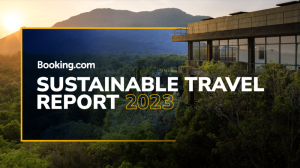
- Nearly half (49%) of travelers believe more sustainable travel options are too expensive, in contrast to 43% willing to pay extra for travel options with a sustainable certification.
- Taking conscious habits from home when traveling, 67% now turn off the air conditioning in accommodations when they aren’t there (up 29% from 2022), while 60% re-use the same towel multiple times (up 25% from 2022)
At a time of general global uncertainty, traveling more sustainably continues to be front of mind for travelers, with three-quarters (74%) believing people need to act now and make more sustainable choices to save the planet for future generations. The news continues to be a key influence driver for 53%, who say the recent climate change news agenda has encouraged them to be more sustainable, and yet it also speaks to a quandary facing people when it comes to being more mindful about when, where and how they travel. While nearly half (49%) think the environment will get worse in the next six months, 64% believe the cost of living crisis will also get worse, leaving people unsure of what to prioritize as they work to reconcile what is important to them with the demands of everyday life.
A tale of two wallets in an unsteady global climate

© Photo from Booking.com
The economic weather has changed drastically since last year, and the big topics at the front of people’s minds today are the cost of living crisis and the climate crisis. Over three quarters (76%) of travelers say they want to travel more sustainably over the coming 12 months, while the same amount think the global energy crisis and rising cost of living is impacting their spending plans. For some travelers the two are mutually exclusive.
With rising inflation, nearly half of travelers are stuck in the notion that they must make a choice between sustainability and spending, with 49% believing more sustainable travel options are too expensive (up 11% from Booking.com’s 2022 data). For these respondents, sustainability and travel combined can seem non-urgent when they are worried about affording bills and the energy crisis.
On the flip side, with travel well and truly back for others and a more urgent focus on conscious choices, 43% of today’s travelers would be willing to pay more for travel options with a sustainable certification , dialing up their spend to feel reassured they are driving impact. As an increasing number of travelers feel the pinch, they are seeking more sustainable travel options rich in rewards, highlighting the perceived trade-off between making conscious choices and saving money and the need for incentivization. Nearly half (49%) want discounts and economic incentives in order to opt for eco-friendly options (up 12% from 2022) while 42% would be encouraged to travel more sustainably with reward points for making more sustainable choices that they could use for free extra perks or discounts through online travel booking sites.
More sustainable travel for everyone
As part of Booking.com’s mission to make it easier for everyone to experience the world, the company believes they have an important responsibility to make sustainable choices easier, both for accommodation providers and travelers. The company’s Travel Sustainable badge provides travelers with an easy-to-understand way to identify a wider range of more sustainable stays. The initiative launched in 2021 and is available to any kind of property from apartments to hotels and even treehouses that have implemented a combination of sustainable practices that meet the requisite impact threshold for their destination. With more than 500,000 properties globally now being highlighted for their sustainability efforts with a Travel Sustainable badge on Booking.com, the company has also further expanded the number of third-party certifications and labels that automatically qualify accommodations to receive it. [ this includes accommodations certified by GSTC-Accredited Certification Bodies and accommodations that are verified to a GSTC-Recognized Standard].
“While travel may be back, rising living costs and climate anxiety has led to greater demand for more budget and planet-friendly options,” said Glenn Fogel, CEO of Booking.com. “Travel can be a force for good and travelers themselves are proving to be today’s changemakers, adopting more sustainable travel habits and seeking responsible experiences. We are listening and together with our partners across the industry, we are leading positive change and examining every part of the trip to support travelers and benefit local communities and environments. More sustainable travel is an investment for the world, and we are committed to making it easier for everyone to experience travel in a more mindful and responsible way, no matter where they are on their sustainability journey.”
Read the full report
Press Release: Cost vs Conscience Booking.com Delves into the Dilemma Dividing Sustainable Travel in 2023 (April 17, 2023)
Booking.com 2023 Sustainable Travel Report (full report in pdf)
Make your accommodation sustainable now!
As the report suggests, travelers and fellow travel provider clients are seeking confirmation that sustainability practices are in place.
Sustainability certification for accommodations is a voluntary, third-party assessment through an audit to ensure compliance with sustainable tourism standards. GSTC does not certify directly. Certification is conducted by Certification Bodies (CB) while GSTC provides an accreditation program through its partner Assurance Services International to accredit Certification Bodies.
Accommodations certified by a GSTC-Accredited CB can use the GSTC logo along with the CB’s mark. The logos are also shared with OTAs and other buyers of hotel space.
Learn more about how to become certified as a sustainable accommodation .
GSTC Sustainable Tourism Training
You can also join one of the regular GSTC courses:
- Want to gain in-depth knowledge of the GSTC Criteria and understand sustainable tourism? The GSTC Sustainable Tourism course is for you.
- Engaged with corporate and business travel? The GSTC Sustainable Business Travel course is for you.
- Are you a hotelier or work in the hospitality sector? GSTC Sustainable Hotel course
✓ Gain in-depth knowledge of the GSTC Criteria, the global standard for sustainability in travel and tourism. ✓ Make informed decisions on how to implement sustainability practices for your company or destination. ✓ Get ready for developing viable and actionable sustainable tourism policies and practices for your organization.
Share This Story, Choose Your Platform!
Related posts.


Preferred by Nature Standard gains GSTC-Recognized Standard Status

Bioscore Standard gains GSTC-Recognized Standard Status

Tokyo Convention & Visitors Bureau Joins GSTC
- Boating Holidays
- Asia & Pacific
- Australia & New Zealand
- Central America
- Indonesia & Indian Ocean
- Middle East
- Scandinavia
- South America
- Business Travel
- Culinary Travel
- Wellness Travel
- Golf Travel
- Travel Style
- Travel Gear
- Travel Fashion
- Real Estate
- Destination Weddings
- Fishing Holidays
- Tricks & Hacks
- Travel News
- #WHERETONEXT
- Read All the Issues
- Working with DRIFT Travel
- Submit Your Photos to DRIFT Travel
- DRIFT Travel Magazine Media Kit

Booking.com’s 2021 Sustainable Travel Report
Latest research from Booking.com reveals how the ‘pandemic effect’ could finally tip sustainable travel intent into impactful action
New research released today from Booking.com, containing insights gathered from more than 29,000 travelers across 30 countries, suggests that the pandemic has been the tipping point for travelers to finally commit to their own sustainable journey, with 72% of global travelers believing people have to act now to save the planet for future generations. As the world of travel starts to open up again, Booking.com’s 2021 Sustainable Travel Report reveals that travelers are more committed than ever to do so in a mindful way, with two thirds (61%) stating that the pandemic has influenced them to want to travel more sustainably in the future and almost half (49%) admitting that the pandemic has shifted their attitude to make positive changes in their everyday lives, with recycling (49%) and reducing food waste (42%) being the top priorities at home.

According to the findings, travelers’ day-to-day sustainable commitments are consistent with their intentions for future trips with 84% wanting to reduce general waste, 83% wanting to reduce their energy consumption (e.g. by turning off air conditioning and lights when they are not in a room) and 79% wanting to use more environmentally friendly modes of transport such as walking, cycling or public transport over taxis or rental cars. Respect for the local community is also high on the list as almost three quarters (73%) want to have authentic experiences that are representative of the local culture when they travel, 84% believe increasing cultural understanding and preservation of cultural heritage is crucial and 76% want to ensure the economic impact of the industry is spread equally in all levels of society. Furthermore, 69% will go as far as avoiding popular destinations and attractions to ensure they aren’t contributing to overcrowding challenges and helping do their part to disperse the positive benefits of travel to less frequently visited destinations and communities.
Breaking down sustainable travel barriers
Fortunately, it’s not just good intentions. Many of these sustainable pledges are coming to fruition, with travelers revealing that while on vacation in the past 12 months, 45% made a conscious decision to turn off their air conditioning/heater in their accommodation when they weren’t there, 43% took their own reusable water bottle, rather than buying bottled water while on vacation and 33% did activities to support the local community. In fact, over half (53%) have admitted that they get annoyed if somewhere they are staying stops them from being sustainable, for example by not offering recycling facilities. The positive signs are indeed there, but there is still lots of room for improvement with more than half of travelers not yet thinking about the local community during their trips or taking these small steps to minimise their impact.

While 81% of travelers say they want to stay in a sustainable accommodation in the upcoming year – which is a notable increase from 62% in 2016, when Booking.com first conducted its sustainable travel research and up 7% from 74% in 2020, just prior to the pandemic – barriers still remain. In fact, when looking just at the 40% of global travelers that said they have not stayed in a sustainable property in the past year, 36% said they didn’t even know that they existed, 32% said they couldn’t find any options where they were traveling and 31% said that they didn’t know how to find them. In fact, 49% of travelers still believe that in 2021, there simply aren’t enough sustainable travel options available.
In terms of awareness and intentions, travelers and properties do appear to be on the same page, with new research revealing that 82%** of Booking.com’s accommodation partners surveyed view sustainability in the hospitality industry as being important. This mirrors the 83% of travelers who also believe sustainable travel is an important issue. However, although 3 out of 4** accommodation partners say they have implemented sustainable steps at their property, only one-third (31%**) actively communicate about their efforts proactively to potential guests, with this mostly happening at the time of check-in (59%**), indicating that significant challenges remain to making sustainability information easy to access for travelers at earlier stages of the booking process.
Closing the gap, step by step
As part of Booking.com’s mission to make it easier for everyone to experience the world and as a leader in travel, the company believes they have an important responsibility to make sustainable choices easier, both for accommodation providers and travelers. That’s why the company is currently rolling out a program for properties that will support them in taking the next steps to become more sustainable, no matter where they might be on that journey. This includes sharing guidance, insights and best practices with properties via various educational opportunities, including handbooks and dedicated content, all available via the Booking.com Partner Hub .
In connection, Booking.com is currently displaying over 30 certifications officially approved by the Global Sustainable Tourism Council (GSTC), Green Tourism and the EU Ecolabel, as well as multiple hotel chain sustainability programs. The company is sourcing this information directly from the certification bodies and displaying it on the property pages of partners who hold one of these established third-party certifications. To complement this, Booking.com is also encouraging its accommodation partners to update their sustainability information, which includes 32 impactful practices across five key categories: waste, energy and greenhouse gases, water, supporting local communities and protecting nature. From this global roll-out, hundreds of thousands of properties have already started to share at least some of their sustainability information with Booking.com, which can be viewed on the ‘Sustainability initiatives’ banner on each of their property pages. While it’s still early days, this is an important first step in providing more sustainability information in a transparent way to consumers, ultimately making it easier for them to start making more sustainable travel choices.
“Over the six years we’ve been conducting this research, it’s been inspiring to see awareness of the importance of sustainable travel consistently grow, both with our customers and now with our partners, too,” said Marianne Gybels, Director of Sustainability for Booking.com . “The good intentions are there on all sides, but there is still a lot of work to be done to make sustainable travel an easy choice for everyone. The more sustainable practices we can help our partners to identify and implement, the more we can experiment with how best to highlight this information to customers and ultimately make sustainability a transparent and easily identifiable part of their travel decision-making process. A small change like eliminating single-use plastics or switching to energy-efficient LED light bulbs might seem insignificant in isolation, but multiplied by millions of travelers and properties around the world, these small steps all start to add up to a much bigger potential positive impact.”
To view the full Booking.com Sustainable Travel Report 2021, please download it via the link HERE ..
RELATED ARTICLES MORE FROM AUTHOR
The Joy of Slow Travel: Getting More From The Experience
5 Beautiful Destinations to Visit This Spring
4 Most Fascinating Seas Everyone Should Visit
Leave a reply cancel reply.
Save my name, email, and website in this browser for the next time I comment.
This site uses Akismet to reduce spam. Learn how your comment data is processed .
Privacy Overview
Adventure of a Lifetime in La Paz, Baja California Sur
Opportunities for industry leaders as new travelers take to the skies
Travel fell sharply during the COVID-19 pandemic—airline revenues dropped by 60 percent in 2020, and air travel and tourism are not expected to return to 2019 levels before 2024. 1 “ Back to the future? Airline sector poised for change post-COVID-19 ,” McKinsey, April 2, 2021; “ What will it take to go from ‘travel shock’ to surge? ” McKinsey, November 23, 2021. While this downturn is worrisome, it is likely to be temporary. McKinsey’s latest survey of more than 5,500 air travelers around the world shows that the aviation industry faces an even bigger challenge: sustainability.
The survey results indicate emerging trends in passenger priorities:
About the survey
We asked about 5,500 people in 13 countries, half of them women, to answer 36 questions in July 2021. Each had taken one or more flights in the previous 12 months. More than 25 percent took at least half of their flights for business reasons; 5 percent had taken more than eight flights in the previous 24 months. They ranged in age from 18 to over 75 and hailed from the US and Canada, the UK, Sweden, Spain, Poland, Germany, Saudi Arabia, India, China, Japan, Australia, and Brazil.
Topics included concerns about climate change and carbon emissions, carbon reduction measures, and factors influencing tourism stays and activities.
We compared the results to those of a survey asking the same questions that we conducted in July 2019.
- Most passengers understand that aviation has a significant impact on the environment. Emissions are now the top concern of respondents in 11 of the 13 countries polled, up from four in the 2019 survey. More than half of respondents said they’re “really worried” about climate change, and that aviation should become carbon neutral in the future.
- Travelers continue to prioritize price and connections over sustainability in booking decisions, for now. This may be partly because no airline has built a business system or brand promise on sustainability. Also, some consumers may currently be less concerned about their own impact because they’re flying less frequently in the pandemic. That said, almost 40 percent of travelers globally are now willing to pay at least two percent more for carbon-neutral tickets, or about $20 for a $1,000 round-trip, and 36 percent plan to fly less to reduce their climate impact.
- Attitudes and preferences vary widely among countries and customer segments. Around 60 percent of travelers in Spain are willing to pay more for carbon-neutral flights, for example, compared to nine percent in India and two percent in Japan.
This article outlines steps that airlines, airports, and their suppliers could take to respond to changing attitudes and preferences. The survey findings suggest that airlines may need to begin with gaining a deeper understanding of changes across heterogenous customer segments and geographies. With those insights in hand, they could tailor their communications, products, and services to differentiate their brands, build awareness among each passenger segment, and better connect with customers.
Would you like to learn more about our Travel, Logistics & Infrastructure Practice ?
The survey findings point to fundamental and ongoing changes in consumer behavior.
After a decade of steady growth in passenger traffic, air travel was hit hard by the pandemic. International air travel immediately fell by almost 100 percent, and overall bookings declined by more than 60 percent for 2020, according to Airports Council International. At the time of writing, revenue passenger miles have returned to close to pre-pandemic levels in the United States, but still lag behind in other markets. 2 “COVID-19: October 2021 traffic data,” International Air Transport Association (IATA), December 8, 2021. In its October 2021 report, before the Omicron variant emerged, the International Air Transport Association (IATA) forecast that the industry’s losses would be around $52 billion in 2021 and $12 billion in 2022. 3 “Economic performance of the airline industry,” IATA, October 4, 2021.
Furthermore, travelers’ preferences and behaviors have changed sharply during the pandemic, particularly around health and safety requirements. An Ipsos survey for the World Economic Forum found that, on average, three in four adults across 28 countries agreed that COVID-19 vaccine passports should be required of travelers to enter their country and that they would be effective in making travel and large events safe. 4 “Global public backs COVID-19 vaccine passports for international travel,” Ipsos, April 28, 2021. And a 2021 survey by Expedia Group found that people buying plane tickets now care more about health, safety, and flexibility than previously. But, there is also renewed interest in travel as nearly one in five travelers expected travel to be the thing they spent the most on in 2021, one in three had larger travel budgets for the year, and many were looking for new experiences such as once-in-a-lifetime trips. 5 “New research: How travelers are making decisions for the second half of 2021,” Skift, August 26, 2021.
Comparing McKinsey’s 2019 and 2021 survey results, sustainability remains a priority as respondents show similar levels of concern about climate change, continue to believe that aviation must become carbon neutral, and want their governments to step in to reduce airline emissions. Some changes were more striking. The share of respondents who say they plan to fly less to minimize their environmental impact rose five percentage points to 36 percent. In 2021 half of all respondents said they want to fly less after the pandemic. Changes in opinion varied across markets. Passengers in the UK, US, and Saudi Arabia, for example, were more likely to feel “flygskam,” (shame about flying) while those in Spain, Poland, and Australia felt significantly less guilty about flying.
It is worth tracking these trends in each market and demographic, because passengers’ experiences and opinions are increasingly relevant: passengers spend far more time online, increasingly trust each other’s recommendations more than traditional marketing, and can reshape brand perceptions faster than ever. 6 “ Understanding the ever-evolving, always-surprising consumer ,” McKinsey, August 31, 2021. In some markets consumers may reward airlines that meet rising demands for environmental sustainability—and punish those who fall behind.
The Australian airline Qantas may be acting on a similar belief. In November 2021, it announced a new “green tier” in its loyalty program. The initiative, based on feedback from passengers, is “designed to encourage, and recognize the airline’s 13 million frequent flyers for doing things like offsetting their flights, staying in eco-hotels, walking to work, and installing solar panels at home”. Qantas states that it is one of the largest private-sector buyers of Australian carbon credits, and it will use program funds to support more conservation and environmental projects. 7 “Qantas frequent flyers to be rewarded for being sustainable,” Qantas media release, November 26,, 2021. “A look at how people around the world view climate change,” Pew Research April 18, 2019. Washington Post-Kaiser Family Foundation climate change survey, July 9 to August 5, 2019.
Given these shifting trends, it may be helpful for all industry stakeholders to maintain a deep and up-to-date understanding of consumer segments in each market that they serve. Three main findings about today’s travelers emerged from the 2021 survey:
Finding 1: Most travelers now have concerns about climate change and carbon emissions—and many are prepared to act on these concerns
Concern about carbon emissions from aviation did not rise much during the pandemic, probably in part because air travel declined so sharply. About 56 percent of respondents said they were worried about climate change, and 54 percent said aviation should “definitely become carbon neutral” in the future.
While these numbers have increased only one or two percentage points since 2019, the share of respondents who rank CO 2 emissions as their top concern about aviation—ahead of concerns such as noise pollution and mass tourism—rose by nine percentage points to 34 percent. More than 30 percent of respondents have paid to offset their CO2 emissions from air travel.
Finding 2: Price and connections still matter much more than emissions to most travelers
Of the nine major factors travelers consider when booking a flight, carbon emissions consistently rank as sixth-most important across customer segments. This may be partly because most airline marketing centers around low cost or superior service, and pricing and revenue management are targeted at price and best connection. Most booking websites allow prospective travelers to sort by price and number of connections, for example, but not by carbon footprint. Google Flights has made a first step, showing average CO2 emissions per flight and improving transparency for travelers.
Travelers might begin to make different choices if emissions featured more prominently in the booking process—particularly if more airlines offered CO 2 reduction measures that delivered genuine environmental impact.
Finding 3: Attitudes vary widely by demographics and geography
Beliefs about the seriousness of climate change, and how to respond to it, vary across demographics and geographies (exhibit). Although younger people are generally more aware of the predicted consequences of climate change, older cohorts have become more concerned about climate change since the 2019 survey. In some countries, large majorities see climate change as a major threat, while that represents a minority view in other countries.
The survey shows that frequent travelers feel slightly more shame about flying than other respondents—37 percent compared to 30 percent—but show a much lower intention to reduce their air travel to minimize their climate impact, at 19 percent compared to 38 percent.
According to Pew Research, more than 80 percent of people in Greece, Spain, France, and South Korea believe climate change is a major threat, compared to around 40 percent of those in Russia, Nigeria, and Israel. 8 “A look at how people around the world view climate change,” Pew Research April 18, 2019. According to 2019 polling by the Washington Post and Kaiser Family Foundation, more than three-quarters of Americans believe it represents a major problem or a crisis—but fewer than half are willing to pay to help address it. 9 Washington Post-Kaiser Family Foundation climate change survey, July 9 to August 5, 2019.
These numbers may change quickly in the next few years as discussions about climate change become less abstract as oceans rise and storms, forest fires, and droughts become more severe. Instead of being one topic of concern among many, millions more people around the world may come to see climate change as today’s greatest challenge.
This shift seems to be apparent in government action, especially in mature economies. The US, for example, announced its intention to exit the Paris Agreement in June 2017 but pledged to rejoin in April 2021. 10 “Climate change: US formally withdraws from Paris agreement,” BBC, November 4, 2020; “President Biden sets 2030 greenhouse gas pollution reduction target,” White House fact sheet, April 22, 2021. And in September, the White House set a goal for the country to produce 3 billion gallons of sustainable aircraft fuel annually by 2030—up from about 4.5 million gallons produced in the US in 2020—which would cut carbon emissions from flying by 20 percent compared with taking no action. 11 “Biden administration advances the future of sustainable fuels in American aviation,” White House fact sheet, September 9, 2021.

Taking stock of the pandemic’s impact on global aviation
How the industry can be cleared for takeoff.
Travelers’ attitudes and behaviors appear to be in flux, and will likely continue to change. Depending on the world’s progress in preventing and treating COVID-19, the industry will likely take at least a couple of years to recover from the downdrafts caused by the pandemic.
In this unique moment in aviation history, airlines may be able to communicate in new ways to inspire passengers to join the fight against climate change. Based on McKinsey’s experience in aviation and other industries around the world, there may be an opportunity for carriers to make it “easy to do good”. When following such an approach, experience shows that customers are drawn to straightforward language, demonstrations of what the industry is doing in this area, and the tangible benefits of those efforts. The most compelling stories are positive and connect with customers’ emotional needs.
As in the early days of travel advertising, airlines could reinforce the idea that the journey is the destination—that “getting there is half the fun.” By inviting customers to get involved in creating a greener future and own the solution, they could forge new partnerships and deepen loyalty.
Actual progress will be essential; organizations that talk about sustainability without demonstrating action may quickly be held to account. Simply keeping pace with trends or regulatory requirements will offer no advantages. Airlines that move boldly, such as by replacing rather than modifying a loyalty program with some kind of “planet-positive” scheme, will stand out from competitors.
The survey results and McKinsey’s work in the industry lead us to believe that the market is ready for a forward-thinking airline to chart a route to a cleaner future for the industry. Leading airlines that build a business strategy and brand promise on sustainability will likely attract a growing share of business and leisure travelers, fresh capital and talent, and new allies across the industry, government, and society at large.
In the years ahead, more customers will be willing to pay for sustainability, particularly if airlines can engage them with interesting approaches, such as gamification in frequent flyer programs, opt-out rather than opt-in offsets, “green fast lanes” for check-ins and security control, and customized emission-reduction offers. Decarbonization could become the standard to reach and maintain next-tier levels in loyalty programs. Passengers will be able to join the global decarbonization team and transform flight shame into flight pride.
Like many private flyers, corporate customers will look for ways to mitigate their CO 2 footprint. Passenger and cargo airlines could craft attractive decarbonization programs to engage the rising numbers of corporates aiming to significantly reduce their scope 3 emissions from air transport.
No single set of approaches will be effective in every geography or with every passenger segment. But airlines with a deep understanding of their customers’ changing needs and desires will continue to outperform those that don’t. Such organizations could recruit more of their passengers to the decarbonization team while protecting their brands, the future of aviation, and the planet itself.
Mishal Ahmad is a manager in McKinsey’s New Jersey office, Frederik Franz is a senior associate in the Berlin office, Tomas Nauclér is a senior partner the Stockholm office, and Daniel Riefer is an associate partner in the Munich office.
The authors would like to thank Joost Krämer for his contributions to this article.
Explore a career with us
Related articles.

Scaling sustainable aviation fuel today for clean skies tomorrow

How airlines can chart a path to zero-carbon flying
We have updated our terms and conditions and privacy policy Click "Continue" to accept and continue with ET HospitalityWorld
We use cookies to ensure best experience for you
We use cookies and other tracking technologies to improve your browsing experience on our site, show personalize content and targeted ads, analyze site traffic, and understand where our audience is coming from. You can also read our privacy policy , We use cookies to ensure the best experience for you on our website.
By choosing I accept, or by continuing being on the website, you consent to our use of Cookies and Terms & Conditions .
- Leaders Speak
- Brand Solutions
- Booking.com Sustainable Travel Report 2024: Indian travellers seek sustainable travel amid weariness
A recent study shows that nearly one-fourth (24 percent) of Indians feel travelling more sustainably is important, but not a primary consideration when planning or booking a trip.
- ETHospitalityWorld
- Updated On Apr 24, 2024 at 12:09 PM IST

- More than half (52 percent) feel that the damage already done is irreversible and that the travel choices they make are not going to change that.
- In fact, 39 percent don’t believe climate change is as severe as people make it out to be and 47 percent feel their time spent travelling is too precious to put sustainability at the top of their decision-making list.
- 53 percent of travellers believe that being more sustainable in a destination that is not implementing sustainability practices itself feels pointless.
- 48 percent of travellers find it more appealing when they come across an accommodation labelled as more sustainable.
- Consistency of certification standards is critical with almost three-fourth (73 percent) of travellers agreeing that all travel booking sites should use the same sustainable certifications or labels.
- The number of travellers who are interested to learn more about why the accommodation was given this label is down 25 percentage points (at 60 percent) when compared with the same time last year, indicating a need for simple, clear communication that enables easy decision-making regardless of priorities.rcent of travellers are interested in learning more about why the accommodation was given a sustainable label.
- Published On Apr 22, 2024 at 08:00 PM IST
All Comments
By commenting, you agree to the Prohibited Content Policy
Find this Comment Offensive?
- Foul Language
- Inciting hatred against a certain community
- Out of Context / Spam
Join the community of 2M+ industry professionals
Subscribe to our newsletter to get latest insights & analysis., download ethospitalityworld app.
- Get Realtime updates
- Save your favourite articles
- hospitality news
- sustainable travel
- Indian travellers
- sustainable
- sustainability
- climate change

IMAGES
COMMENTS
(Shared from globalnews.booking.com)Latest research from Booking.com reveals how the 'pandemic effect' could finally tip sustainable travel intent into impactful action. • 83% of global travelers think sustainable travel is vital, with 61% saying the pandemic has made them want to travel more sustainably in the future. • Almost half (49%) still believe that in 2021, there aren't ...
As the world of travel starts to open up again, Booking.com's 2021 Sustainable Travel Report reveals that travelers are more committed than ever to do so in a mindful way, with two thirds (61%) stating that the pandemic has influenced them to want to travel more sustainably in the future and almost half (49%) admitting that the pandemic has ...
As the world of travel starts to open up again, Booking.com's 2021 Sustainable Travel Report reveals that travelers are more committed than ever to do so in a mindful way, with 61% stating that the pandemic has influenced them to want to travel more sustainably in the future. According to the findings, travelers' day-to-day sustainable ...
news.booking.com
0 3 Sustainable Travel 15 0 4 Sustainable Operations 23 Our Environmental Stewardship ... BOOKING HOLDINGS 2021 SUSTAINABILITY REPORT. GLENN D. FOGEL CHIEF EXECUTIVE OFFICER & PRESIDENT A Note from Our CEO 2021 was a year defined by continued hardship mixed with resiliency and hope. While the pandemic
As the world of travel starts to open up again, Booking.com's 2021 Sustainable Travel Report reveals that American travelers are more committed than ever to do so in a mindful way, with just under half (46 percent) stating that the pandemic has influenced them to want to travel more sustainably in the future and almost half (42 percent ...
Now in its eighth year, Booking.com's annual Sustainable Travel Report has gathered insights from over 33,000 travellers across 35 countries and territories and reveals some eye-opening trends in travel. It highlights how economic uncertainty is informing sustainable travel decisions in 2023 - with people facing the dilemma of potentially ...
The company's 2021 Sustainability Report highlights their sustainability framework and progress made thus far. In 2021, Booking.com surveyed 29,000 travelers about sustainable travel. In 2021, Booking.com surveyed 3,390 accommodation providers about sustainable travel and found that 82% of partners we surveyed think sustainability is an ...
As the world of travel starts to open up again, Booking.com's 2021 Sustainable Travel Report reveals that Canadian travellers are more committed than ever to do so in a mindful way, with almost half (47%) stating that the pandemic has influenced them to want to travel more sustainably in the future and roughly the same amount (48%) sharing ...
As the world of travel starts to open up again, Booking.com's 2021 Sustainable Travel Report reveals that American travelers are more committed than ever to do so in a mindful way, with just ...
As the world of travel starts to open again, Booking.com's 2021 Sustainable Travel Report reveals that American travelers are more committed than ever to do so in a mindful way, with just under half (46 percent) stating that the pandemic has influenced them to want to travel more sustainably in the future. Interestingly, the United States ...
Travel Sustainable program launched for Booking.com accommodations in 2021 Launch Travel Sustainable program for accommodations across all relevant brands by the end of 2023 Launch Travel Sustainable program for cars, rides and flights by the end of 2023 We commit to making it easier for travelers to book sustainable trips.
November 2022 we expanded our Booking.com Travel Sustainable program across all Booking Holdings brands for accommodations. The program recognized more than 400,000 properties globally as of December 31, 2022, providing customers with a transparent, simple way to identify properties making efforts to become more sustainable, no
Booking.com's Sustainable Travel Report 2022 contains insights gathered from more than 30,000 travelers across 32 countries and territories, highlighting that the impact of their trips remains top of mind, with 71% of global travelers saying that they want to travel more sustainably over the coming 12 months, which is a 10% increase over the company's 2021 data.
Booking.com's Sustainable Travel Report 2023 contains insights gathered from more than 33,000 travelers across 35 countries and ... The initiative launched in 2021 and is available to any kind of property from apartments to hotels and even treehouses that have implemented a combination of sustainable practices that meet the requisite impact ...
83% of global travelers think sustainable travel is vital, with 61% saying the pandemic has made them want to travel more sustainably in the future; Almost half (49%) still believe that in 2021, there aren't enough sustainable travel options available, with 53% admitting they get annoyed if somewhere they are staying stops them from being sustainable, for example by not providing recycling ...
In fact, 49% of travelers still believe that in 2021, there simply aren't enough sustainable travel options available. In terms of awareness and intentions, travelers and properties do appear to be on the same page, with new research revealing that 82%** of Booking.com's accommodation partners surveyed view sustainability in the hospitality ...
And where there is interest, there is opportunity for providers and destinations. That is the message of Booking.com's annual Sustainable Travel Report, now in its seventh year. in 2021 we introduced our Travel Sustainable badge — a first of its kind in the industry. It already recognises more than 95,000 properties globally for their ...
At the time of writing, revenue passenger miles have returned to close to pre-pandemic levels in the United States, but still lag behind in other markets. 2 "COVID-19: October 2021 traffic data," International Air Transport Association (IATA), December 8, 2021. In its October 2021 report, before the Omicron variant emerged, the ...
Santosh Kumar, Country Manager, India, Sri Lanka, Maldives and Indonesia at Booking.com, commented, "In its 9th year now, Sustainable Travel Report 2024 presents a timely picture on traveller views, perceptions, habits and potential barriers when it comes to more sustainable travel. Each year, we see travellers expressing their intentions and ...
Booking.com Sustainable Travel Report 2024: Indian travellers seek sustainable travel amid weariness. A recent study shows that nearly one-fourth (24 percent) of Indians feel travelling more sustainably is important, but not a primary consideration when planning or booking a trip. ... Maldives and Indonesia at Booking.com commented "In its ...
As the world of travel starts to open up again, Booking.com's 2021 Sustainable Travel Report reveals that travelers are more committed than ever to do so in a mindful way, with two thirds (61% ...